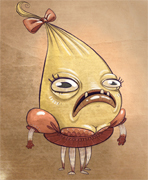|
I tried to read the first Mistborn book and my eyes glazed over. Check it out from the library before purchasing,
|
|
|
|

|
| # ? May 12, 2024 10:25 |
|
10th anniversary Elantris has like 30%? Changed content. The original was rough but had one of his best Avalanches and the best anti-villain.
|
|
|
|
I actually like Elantris the most out of what I've read of Sanderson (Warbreaker, the Mistborn trilogy). It's rough, sure, the solution is stupid as hell, but there's something simple and honest about it. It's not ambitious but it fulfills the goals it sets. It's honestly the only Sanderson I'd consider re-reading.
|
|
|
|
|
That's how I feel about it, honestly. Hrathen is still his best character by leaps and bounds and I feel like his RPG-manual worldbuilding has gotten more intrusive since Elantris, to the point where the Stormlight intro felt like a tutorial level.
|
|
|
|
Elantris is Sanderson at his simplest; a quick airport novel that has no real characters but explores a cool magic system. I'd genuinely recommend it as a first novel; it's a fast read and lays out his style at its most basic, so you can get a quick feel for if you enjoy his books. I really liked the first Mistborn book, but it's pretty similar to Rothfuss' stuff in that I found the 2nd and 3rd books so mediocre/ bad respectively that they almost retrospectively ruined the 1st novel, particularly the solutions to the plot problems/ magic system expansions.
|
|
|
|
It's far from fantasy but I quite enjoyed Sanderson's short SF story Firstborn.
|
|
|
The Supreme Court posted:I really liked the first Mistborn book, but it's pretty similar to Rothfuss' stuff in that I found the 2nd and 3rd books so mediocre/ bad respectively that they almost retrospectively ruined the 1st novel, particularly the solutions to the plot problems/ magic system expansions.
|
|
|
|
|
I think that the Mistborn books really really suffered from the fact that he was a relatively unknown author back then, because it has that thing where the first book in a potential series also functions as a standalone novel, just in case it doesn't take off, so he had to wrap all that stuff up in the first book, which led to the second book being a disjointed pile of crap. I think that if he wrote that series now it would be stronger simply because he could rely on selling the trilogy through his name alone and wouldn't have to worry about that kind of thing. EDIT: I don't think that the Mistborn books would have been good if that were the case, just that they'd be better. Khizan fucked around with this message at 01:19 on Feb 6, 2016 |
|
|
|
Arbite posted:It's far from fantasy but I quite enjoyed Sanderson's short SF story Firstborn. His shorter works tends to be his best. That, emperors soul, the virtual reality one.
|
|
|
|
While we're trading names of better writers than Rothfuss, how do people here feel about Andre Norton? I bought the Lost Lands of Witch World trilogy a while back (and grabbed a bunch of public domain stuff too) and I've liked it overall (with the exception of a few parts that I'm not sure I get, like Kaththea's time among the weird brutal primitive snow nomads that keeps setting off my "this is racist" alarm in my mind although I can't quite articulate why)
|
|
|
|
I can't quite grasp the "i like the magic system" as a reason to read a book.
|
|
|
|
Groovelord Neato posted:I can't quite grasp the "i like the magic system" as a reason to read a book. I like reading stories about people learning some sort of system, and then learning how to use that system in clever ways to solve problems. The example I have is sci-fi, but basically the entirety of Asimov's Robots series is about bending the interpretation of the 3 Laws of Robotics. It's fascinating to me to watch an author establish a system that makes sense when it's used in ideal conditions, and then introduce strange or extreme circumstances that force that system to be broken or used in a clever way. It doesn't happen very often in Name of the Wind, but there a few small, clever uses of it, and then the climax of the book has Kvothe pushing the system to its (or his, I suppose) limit. A good magic system does not a good book make, but it can make a good book great, and a bad book a real shame of wasted potential. Rothfuss is somewhere in between, I feel.
|
|
|
|
HIJK posted:I tried to read the first Mistborn book and my eyes glazed over. Check it out from the library before purchasing, I did the first time too but then I tried again and I'm glad I did.
|
|
|
|
If you like gimmick magic systems than it's worth reading Sanderson. Aside from that he's really not worth the time.
|
|
|
|
Oh hello I didn't see you there. I'm Pendrick Rufus. A handsome modern man. I write a book. The sexy hero who can just gently caress gently caress gently caress for weeks at a time and all his partners squirt like a supersoaker, all his life he's just been a sinewy implication in the shadows of the bedchamber but now he's a white-hot reality who kindles a mighty inferno in the heart of her womanhood. He has a sword with a name. He's drop-dead gorgeous and he sings like a nightingale. The sexy hero is me. Sometimes I squeeze my lamb-shank appendage in a book until it turns blue. I keep all my beard shavings in case I ever need them. I tried twenty-six times to learn to pick locks but never succeeded. What I call a woman's secret passage, she calls her navel. I have never been loved. I've always been loved. I am a brain. I am love.
|
|
|
|
Groovelord Neato posted:I can't quite grasp the "i like the magic system" as a reason to read a book. It's not the only thing that makes me like his books. But Sanderson very much tries to have a "hard science-fiction" magic system. His characters use said magics in often clever or unexpected ways, but they always follow the laws of their system. No "magic" tachyon beams in Star Trek that can do pretty much anything the plot demands. Since I like clever but logical application of real or speculative technology in sci-fi, I like similar uses of magic in fantasy.
|
|
|
|
Avshalom posted:Oh hello I didn't see you there. I'm Pendrick Rufus. A handsome modern man. I write a book. The sexy hero who can just gently caress gently caress gently caress for weeks at a time and all his partners squirt like a supersoaker, all his life he's just been a sinewy implication in the shadows of the bedchamber but now he's a white-hot reality who kindles a mighty inferno in the heart of her womanhood. He has a sword with a name. He's drop-dead gorgeous and he sings like a nightingale. The sexy hero is me. Sometimes I squeeze my lamb-shank appendage in a book until it turns blue. I keep all my beard shavings in case I ever need them. I tried twenty-six times to learn to pick locks but never succeeded. What I call a woman's secret passage, she calls her navel. I have never been loved. I've always been loved. I am a brain. I am love. Good to have you back!
|
|
|
|
Avshalom posted:Oh hello I didn't see you there. I'm Pendrick Rufus. A handsome modern man. I write a book. The sexy hero who can just gently caress gently caress gently caress for weeks at a time and all his partners squirt like a supersoaker, all his life he's just been a sinewy implication in the shadows of the bedchamber but now he's a white-hot reality who kindles a mighty inferno in the heart of her womanhood. He has a sword with a name. He's drop-dead gorgeous and he sings like a nightingale. The sexy hero is me. Sometimes I squeeze my lamb-shank appendage in a book until it turns blue. I keep all my beard shavings in case I ever need them. I tried twenty-six times to learn to pick locks but never succeeded. What I call a woman's secret passage, she calls her navel. I have never been loved. I've always been loved. I am a brain. I am love.  You are entering my brightplace.
|
|
|
|
"NPR BOOK REVIEWS posted:
I quit.
|
|
|
|
BananaNutkins posted:I quit.  ------ Also, for those people who are interested in looking at the mysteries in Name of the Wind and The Wise Man's Fear and speculating on what comes next, this reread by Jo Walton is fun. It goes through sets of chapters and highlights interesting details and clues. The comment section occasionally has some good insights too. It's a neat way to see things you might not have picked up on, and its interesting to see the different theories people come up with.
|
|
|
|
If you don't like the quality of the books or their criticism being discussed, there's plenty of nerd forums where you can sing paeans to a fascinatingly bad series. Also, theorycrafting is the dumbest possible method of artistic analysis. Like that whole blog post series seems to miss such important questions like "is any of this well written"? Does it actually have anything substantial to say about the writing or -- quote:The prologue, “A Silence of Three Parts” is in an omniscient and distant “fantasy style” narration. e: quote:The innkeeper—still nameless—brings stew and bread. I can’t imagine why John Scalzi has a problem with this, but then stew is one of the staple foods of my culture. What Diana Wynne Jones complained about in The Tough Guide to Fantasyland wasn’t the existence of stew in fantasy but the way people eat it around the campfire, when in fact it takes hours to cook. But they’re in an inn, they’ve had hours, and goodness knows it’s a cheap and filling way of feeding people. Scalzi might think it’s a terrible cliche when I eat it as well. (Last summer when I was in Britain the weather was awful, and I ate stew twice, in an inn and in a castle—if you’re ever in Castell Coch, near Cardiff, order the stew. It may be a cliche, but it tastes great. You can have apple pie for dessert, unless that’s a cliche, too.) This person can only communicate literary criticism in the form of cliches and tropes. BravestOfTheLamps fucked around with this message at 07:59 on Feb 15, 2016 |
|
|
|
BravestOfTheLamps posted:If you don't like the quality of the books or their criticism being discussed, there's plenty of nerd forums where you can sing paeans to a fascinatingly bad series. gently caress, sorry, I forgot that having fun with books is not okay, and we can only look at them as Art and compare them to classics like A Tale of Two Cities so that we can maximally belittle them.
|
|
|
|
Uranium Phoenix posted:gently caress, sorry, I forgot that having fun with books is not okay, and we can only look at them as Art and compare them to classics like A Tale of Two Cities so that we can maximally belittle them. I actually have lots of fun with Kingkiller Chronicle. It's an almost inexhaustible source of fun for me. I could probably make whole essays about a single paragraph or even sentence Rothfuss has written. If some snide dismissal of theorycrafting is enough to ruin your day, aren't you the one unable to have fun?
|
|
|
|
BravestOfTheLamps posted:I actually have lots of fun with Kingkiller Chronicle. It's an almost inexhaustible source of fun for me. I could probably make whole essays about a single paragraph or even sentence Rothfuss has written. BravestOfTheLamps posted:If some snide dismissal of theorycrafting is enough to ruin your day, aren't you the one unable to have fun?
|
|
|
|
Coming soon: Let's critically read the Kingkiller Chronicle
|
|
|
Uranium Phoenix posted:...because, "snide dismissal" got old 500 posts ago. Everything that isn't people calling Rothfuss history's greatest monster is met with snide dismissal. People are free to dismiss the book or criticize it, as they have, but the same criticisms repeated ad naseum get boring. Admittedly, that reread is hilarious: quote:The thing that The Wise Man’s Fear proves beyond all doubt is that Rothfuss is in control of his material. He really knows what he’s doing and he’s prepared to take the time to do it right. This is all one story, and it’s a story in which storytelling is very important. We can trust him.
|
|
|
|
|
anilEhilated posted:Sorry the thread doesn't fit your standards for high entertainment, then? Apology accepted.
|
|
|
|
ESTRAGON: I can't go on like this. VLADIMIR: That's what you think. ESTRAGON: If we parted? That might be better for us. VLADIMIR: We'll hang ourselves tomorrow. (Pause.) Unless Godot comes. ESTRAGON: And if he comes? VLADIMIR: We'll be saved. - Samuel Beckett, Waiting for Godot LET’S READ THE KINGKILLER CHRONICLE CRITICALLY Preface (aka A Shitpost of Three Farts) This is a critical read-through of Patrick Rothfuss’s The Kingkiller Chronicle series of fantasy novels. It will critically examine The Name of the Wind and Wise Man's Fear. This will not involve theorycrafting or whatever. We’re looking at what matters: the writing. Attentive readers of this thread are aware that I loathe Rothfuss’s books and how they are written, and no doubt expect this reading to be biased and unfair. My defense: I am also an attentive reader. In this critical series, I hope to move beyond simplistic readings of The Kingkiller Chronicle. I will show, by discussing each chapter of the books, the principles and effects of their writing. Hopefully by the end we will have exorcised the ghost that haunts us all. BravestOfTheLamps fucked around with this message at 18:08 on Jul 14, 2016 |
|
|
|
Ooh, this could be good. You have my attention.
|
|
|
|
BravestOfTheLamps posted:ESTRAGON: I can't go on like this. And here. We. Go!
|
|
|
|
LET's READ THE KINGKILLER CHRONICLE CRITICALLY PART 1: “In fact there were none of these things...” The saga of The Kingkiller Chronicle begins with a map. It’s of little interest, especially when the story starts dully enough after this promise of faraway lands and adventure. The Name of the Wind posted:It was night again. The Waystone Inn lay in silence, and it was a silence of three parts. This sets the stage rather aptly. Fantasy stories set in imaginary worlds must establish their setting and what makes it interesting. The motifs used to draw in the reader are natural forces ("night"), the hint of cycles (“again”), the setting (the Inn), and awkward stab at poetic form (“silence of three parts”). Consider the rhythm of these sentences, and how it relates to the principal objects of interest. Everything simply pops up: the night, the Waystone Inn, the silence, the three parts. The point-counterpoint repetition of the two clauses doesn't add anything. We begin with the cyclical image of day and night, which segues into this bizarre division. The result is rough. Compare to how the Gormenghast trilogy introduces its setting: Titus Groan posted:Gormenghast, that is, the main massing of the original stone, taken by itself would have displayed a certain ponderous architectural quality were it possible to have ignored the circumfusion of those mean dwellings that swarmed like an epidemic around its outer walls. This is forceful, yet careful and precise. The faux-awkward halt of “that is” allows for a pause after "Gormenghast". It's followed by an almost antiquarian description that then veers back into grotesque (“those mean dwellings that swarmed like an epidemic...”). This interplay of grotesque and antiquarian sets the tone for the whole novel masterfully. The principal idea of the motif of silence is that the object of interests in the scene (the outside, the two men, the innkeeper) are all separate and exude an overwhelming pressure on the scene. This ends up being self-defeating: the defining motif is supposed to be absence, yet the prose itself works to fill any possible void. “Silence in three parts” ties the paragraph up instead of leaving some emptiness. “Things that were lacking” is vague. Instead of the simple allure of the “the clamour and clatter of a drinking house” we get “the clatter and clamour one expects from a drinking house” with the awkward bridging words in the middle. Poetic word choices like “deep and wide as the autumn’s ending” are simply too broad, they end up filling the reader’s imagination instead of working it. You can observe the rhythm of the writing by reading it aloud. Look at something like the awkward pairings of Anglo-Saxon and Latinate, like “serious discussion of troubling news”. This is tautological, and the two parts end up hampering each other (“They avoided serious discussion” or “They avoided troubling news”). The passage from Titus Groan is worlds apart. Notice how the more monosyllabic Anglo-Saxon gives way to the Latinate here: “Gormenghast... taken by itself would have displayed certain ponderous architectural quality”. This shows how important rhythm is to prose. The Name of the Wind posted:His eyes were dark and distant, and he moved with the subtle certainty that comes with knowing many things. I suggest that the best way to describe Rothfuss's writing is “plodding”. His prose is stuffed with nonsense like “the subtle certainty that comes with knowing too many things”. Whenever there’s some poetic fancy, he overloads it with significance and oxymoron. Again, think about it: his character moves in a way that betrays his knowing many things. Of course, the reader probably quite can’t imagine what this means, so this vagueness stays to haunt them. This might be the principal reason why anyone would admire Rothfuss's writing:. What sets the tone for this fantasy world is vague, pressing tension. For better and for worse. quote:It was the patient, cut-flower sound of a man who is waiting to die. BravestOfTheLamps fucked around with this message at 10:49 on Jul 26, 2016 |
|
|
|
Tropes coming in so fast and hard in Wise Man's Fear I was wondering when the Fremen/Aiel would show up. I was not disappointed.
|
|
|
|
you're doing the lord's work
|
|
|
|
Enjoying. Keep it up Bravest!
|
|
|
|
Loving it Bravest, please keep it up!
|
|
|
|
BravestOfTheLamps posted:If you don't like the quality of the books or their criticism being discussed, there's plenty of nerd forums where you can sing paeans to a fascinatingly bad series. I like this book forum because unlike many other book forums, elfbook nerds and jerks who like Don DeLillo brush shoulders pretty freely. Also most places to talk about fantasy books online are just filled with circlejerks about the big hits of the last decade or so and not much else. Also I like Jo Walton's books alright, but I've ceased being surprised when authors I like turn out to have bad taste. Especially if the work in question is something broadly popular and influential. Lightning Lord fucked around with this message at 05:20 on Feb 16, 2016 |
|
|
|
LET'S READ THE KINGKILLER CHRONICLE CRITICALLY PART 2: “’Hush now, you’ll get all the answers before the end,’ Jake said. ‘Just let him tell it.’”. So. Let's talk a bit about tone with Chapter 1: “A Place for Demons”. quote:It was felling night, and the usual crowd had gathered at the Waystone Inn. Five wasn’t much of a crowd, but five was as many as the Waystone ever saw these days, times being what they were. It’s an abrupt change of scenery and tone from the prologue. The register switches from poetic and portentous to realistic and conversational. That a different scene may require a different register is understandable, but this is not so much a stylistic choice as it is two literary influences struggling for space. I'll have to elaborate on this at a later date.. The action starts with five men of the village in a storytelling session, with the mysterious innkeeper, Kote, listening in on them. We’re introduced to the menace of the Chandrian, legendary figures for whom no description can do justice. And the talk of demons is dramatically interrupted by another man of the village, who brings in the corpse of a monstrous creature that attacked him. Kote knows more than he lets on, and there’s tension over how to handle the creature. The principal failure of this chapter (and how sad is it that I have to concentrate on principal failures) is the inability to maintain tone. The men bickering is too straight-laced to be comic or build up the nervousness of the scene. Carter’s dramatic entrance is deflated by dialogue, which incidentally illustrates Rothfuss’s uneven realism: quote:A moment of serious silence followed the news. The smith’s prentice laid a sympathetic hand on Carter’s shoulder. “drat. That’s hard. She was gentle as a lamb, too. Never tried to bite or kick when you brought her in for shoes. Best horse in town. drat. I’m…” He trailed off. “drat. I don’t know what to say.” He looked around helplessly. Rothfuss does his best to undermine this segue into horror. The object of horror expired before it even entered the narrative properly, and the focus is on the rustics' nervousness. This is how the scene shifts: quote:Everyone startled, then relaxed when the black thing remained motionless. Cob and the others exchanged shaky smiles, like boys spooked by a ghost story. Their smiles went sour as the room filled with the sweet, acrid smell of rotting flowers and burning hair. The tension is defused as Rothfuss describes vague restlessness rather than the aftermath of horror. I found The Last Unicorn through this thread, and this chapter reminds me of this scene in the beginning: The Last Unicorn posted:“Unicorns are long gone,” the second man said. “If, indeed, they ever were. This is a forest like any other.” That is consistent tone: fairy-tale dichotomy of naivety and cynicism. And we’re not quite done with this topic. We’re introduced to Bast, Kote’s odd student-partner in a baffling scene. These quotes are all from the same conversation: quote:“Today, master, I learned why great lovers have better eyesight than great scholars.” quote:Bast opened his mouth, but Kote continued before he could say anything. “Yes, I made sure the pit was deep enough. Yes, I made sure there was rowan wood in the fire. Yes, I made sure it burned long and hot before they buried it. And yes, I made sure that no one kept a piece of it as a souvenir.” He scowled, his eyebrows drawing together. “I’m not an idiot, you know.” quote:“Begone demon!” Kote said, switching to a thickly accented Temic through half a mouthful of stew. “Tehus antausa eha!” This again shows the inconsistence of tone. First we have playful irony, then confrontation, and then farcical irony. And notice the return to playful irony at the very end! And each of these tones is presented straight: there is no contrast between Bast's playfulness and the seriousness of the situation. Kote's comic outburst is off-putting. And this is after the scene of slight horror. This would be the perfect time for characters talking portentously about how the storm approaches or the days are growing dark. There is no driving motif here except for the mystery surrounding Kote. But this suffers from the conflicting tones already mentioned. After this, we find more about Kote’s disquiet and the mysterious chest in his room. The scene then shifts again, and we’re treated to the village’s worries over farming and taxation to distract from further portents. quote:Still, each of them bought a piece of cold-wrought iron from the smith, heavy as they could swing, and none of them said what they were thinking. Instead they complained that the roads were bad and getting worse. They talked about merchants, and deserters, and levies, and not enough salt to last the winter. They reminisced that three years ago no one would have even thought of locking their doors at night, let alone barring them. Catalogue of Rothfussian attributes quote:He pulled more beer for Jake, Shep, and Old Cob, moving with an air of bustling efficiency. quote:Old Cob tucked away his bowl of stew with the predatory efficiency of a lifetime bachelor. quote:He washed the tables and the bar, moving with a patient efficiency. BravestOfTheLamps fucked around with this message at 15:47 on Sep 21, 2017 |
|
|
|
Apparently Rothfuss is a big fan of bathos, or deflating a tense situation with humor or something. Now that you spell it out though, it does feel a little odd and wrong since he didn't really do it that well. I've never studied literary criticism though, so this is really interesting and enlightening. Thanks.
|
|
|
|
Bravest you're doing God's work.
|
|
|
|

|
| # ? May 12, 2024 10:25 |
|
I thought the reviews of better books were great, now the threads about to get amazing.
|
|
|

































